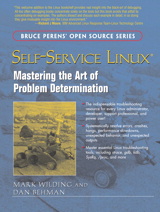
|
FreeComputerBooks.com
Links to Free Computer, Mathematics, Technical Books all over the World
|
|
- Title: Self-Service Linux: Mastering the Art of Problem Determination
- Author(s) Mark Wilding, Dan Behman
- Publisher: Prentice Hall; 1 edition;
- License(s): Open Publication License
- Paperback: 456 pages
- eBook: PDF, 8.3 MB
- Language: English
- ASIN: 013147751X
- ISBN-13: 978-0131477513 :

|
The biggest factor in a company's decision to go with Linux is overcoming thesupport issues. Adopting Linux successfully means taking on a differentapproach to support. Since Linux is open source, there are different methodsto get the support that companies need. This includes deeper skills on how toinvestigate problems, how to get help from the open source community (i.e.how to ask for help on usenet) and how to resolve problems in-house withoutthe extra cost of a consultant.
This book should be an essential part of every company's Linux adoption plan to keep the total cost of ownership (TCO)down and improve the ROI of their Linux strategy. It is also a book that advanced Linux professionals running their own Linux systems will be able touse to troubleshoot. This book gives the staff the basics they need to diagnose most problems that they will face and will go into the nitty-gritty on the toughest problems. It also points users to the appropriate resources so that they may get help quickly.
About the Authors- N/A

- Self-Service Linux: Mastering the Art of Problem Determination (Mark Wilding, et al)
- The Mirror Site (1) - PDF
- The Mirror Site (2) - PDF
-
 Linux Fundamentals (Paul Cobbaut)
Linux Fundamentals (Paul Cobbaut)
This book provides a soft, accessible, and practical introduction to Linux environments and command line basics, from a basic approach to Linux to a more advanced server-oriented look at using Linux.
-
 Linux Quick Fix Notebook (Peter Harrison)
Linux Quick Fix Notebook (Peter Harrison)
This books includes many of the most commonly encountered errors with explanations of their causes and how to fix them. The book's format is aimed at sys admins who often have to do advanced tasks in which the underlying theory is understood,
-
 Linux Patch Management: Keeping Linux Systems Up To Date
Linux Patch Management: Keeping Linux Systems Up To Date
This book is the first start-to-finish guide to patching Linux systems in production environments. It presents patching solutions for Red Hat, Fedora, SUSE, Debian, and other distributions, covers both distribution-specific tools and widely used tools.
-
 User Mode Linux (Jeff Dike)
User Mode Linux (Jeff Dike)
This book covers everything from getting started through running enterprise-class User Mode Linux servers. You'll find authoritative advice on bootup, compilation, administration, specialized configurations, and much more.
-
 The Daemon, the Gnu, and the Penguin (Peter H. Salus)
The Daemon, the Gnu, and the Penguin (Peter H. Salus)
In addition to covering a history of free and open source, This book explores how free and open software is changing the world. The author interviewed well over a hundred key figures to document the history and background of free and open source software.
-
 Understanding the Linux Virtual Memory Manager (Mel Gorman)
Understanding the Linux Virtual Memory Manager (Mel Gorman)
This book is unique in that not only does it describe the Linux Memory Manager itself in unprecedented detail, it also includes the theoretical foundations for both developers and students but has been omitted from recent Linux kernel related material.
-
 The Linux Development Platform (Rafeeq Ur Rehman, et al)
The Linux Development Platform (Rafeeq Ur Rehman, et al)
This book describes how to build a development environment based upon Linux systems. It provides a one-stop reference on all the tools used by the Open Source community for development purposes.
-
 Managing Linux Systems with Webmin: System Administration
Managing Linux Systems with Webmin: System Administration
This book explains how to use the most popular Webmin modules to perform common administration tasks on a Linux system such as adding users, configuring Apache, setting up NFS file sharing and managing the Sendmail mail server.
-
 Linux Appliance Design: A Hands-On Guide (Bob Smith, et al)
Linux Appliance Design: A Hands-On Guide (Bob Smith, et al)
This book shows how to build better appliances - appliances with more types of interfaces, more dynamic interfaces, and better debugged interfaces. You'll learn how to build backend daemons, handle asynchronous events, and connect various user interfaces.






